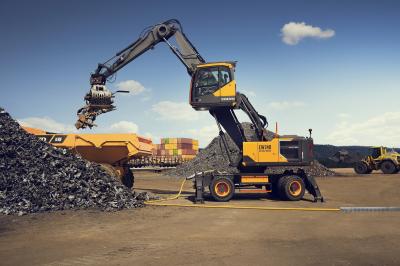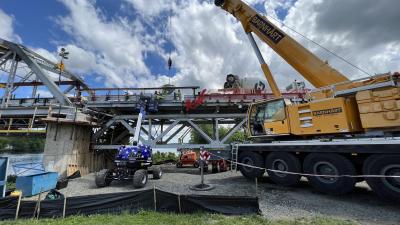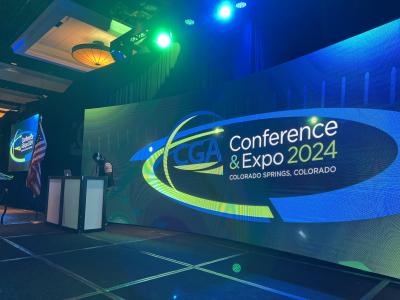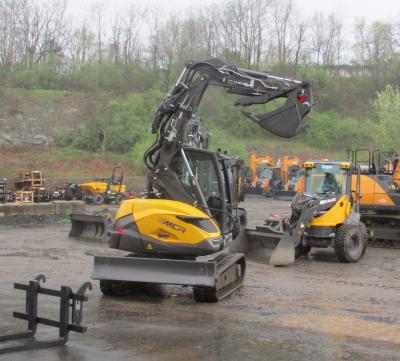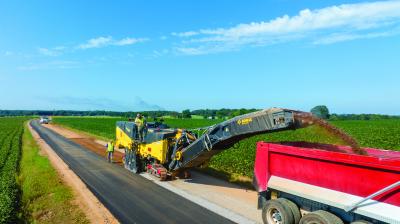Not long ago Paul Gustafson operated traditional asphalt repair equipment and was living paycheck to paycheck like many working Americans. Now he owns CT Infrared, a Woodbury, Conn.-based asphalt repair company that's tripled its business and profit with half the labor in two years, and is on track for $1 million in sales this year.
Real success, however, didn't begin until about two years ago when Gustafson switched his business from conventional "saw, cut, and remove" and "crack filler" asphalt repair techniques to infrared asphalt repair.
While conventional repair requires the labor and equipment intensive removal of old asphalt from a damaged site and its replacement with new asphalt, the infrared technique expedites repair by heating, fusing and compacting recycled asphalt with minimal equipment, labor and new material. The infrared technique can provide superior public, commercial or residential asphalt repairs (such as roads, parking lots, and driveways) at a lower cost than conventional methods, according to the company.
But when Gustafson first looked into infrared technology, his future success was almost deterred before it started.
"I called one manufacturer of infrared asphalt repair equipment and was put off by a guy who acted like I was taking up his time," he said.
"Finally I found one manufacturer, Kasi, willing to walk me through the infrared process and my fortune changed."
Claremont, N.H.-based Kasi Infrared is one of the few manufacturers in the industry that offers hands-on training, support and guidance for those new to the technology.
"Going from traditional cut-and-remove asphalt repair to infrared repair with Kasi has tripled our business and profit, while cutting our costs in half," said Gustafson. "Instead of cutting, removing and throwing away a traditional asphalt patch, we can use mostly recycled material. We can do a typical 5x7 ft. repair in less than 20 minutes with one piece of equipment, a truck and two guys. Since cars can drive on it immediately, there's almost no traffic disruption.
"Before we were throwing away five tons of asphalt a day from cutting and repairing," added Gustafson. "Now we're able to reuse that asphalt, which for us is a savings of about $650 per day."
To do the same 5 by 7 ft. (1.5 by 2 m) cut-and-remove asphalt repair would typically take about five or six laborers several hours of work using a pavement saw to cut a straight edge around the damaged area, a jack hammer to break up the existing pavement, a bucket loader to excavate material, two trucks (one to remove excavated material and one to bring fresh asphalt) and a roller to compact the repair. It also would require enough new asphalt to replace all the excavated material, according to Gustafson.
Infrared asphalt repair withstands weathering and traffic to last longer than conventional repair as well.
"When a utility company did a compaction test on my infrared repair, it had a 95 percent compaction rate which is phenomenal," said Gustafson. "Eight months later, the repair looked the same as the day we left the job. I had to get out of my truck and search for it because it blended so well with the existing roadway."
Unlike traditional "saw, cut, and remove" or "crack filler" asphalt repair techniques, Kasi's infrared asphalt repair has no seams for water and ice to penetrate. Instead, its infrared restorations fuse to the existing pavement, creating a continuous surface. This eliminates the need for tack-coating the edges, enhances durability, and allows roads to be opened to traffic immediately.
For entrepreneurs like Gustafson, another big plus of infrared asphalt repair is the ability to work through snow and cold weather, while conventional repair cannot.
"Since we're putting hot asphalt to hot asphalt at a workable temperature, we can do a seamless repair even in snow, and there are no cold joints," added Gustafson. "That means we can work year-round when conventional repair cannot. People are stopping us; they want our cards and brochures. They're going to our Web site and hiring us to fix their parking lots in winter."
Because of infrared asphalt repair's advantages over conventional repair, Gustafson has rapidly expanded his business into new markets.
"Before, to compete with a utility contractor, we would've had to spend about $700,000 in equipment," he said. "But we spent just $150,000 on Kasi equipment and are doing the same jobs the big guys are doing, only better and faster."
Gustafson has found that infrared asphalt repair virtually sells itself once he gives a free demonstration to prospects.
"The demos have opened up a huge new customer base for us and have about a 90 percent close rate," he said. "When property managers for cities, malls, condos, offices, or even homeowners see how the technology can repair their asphalt for one-third the traditional cost, we get the contract."
Kasi's infrared asphalt repair equipment is commonly used by both public and private maintenance/transportation managers for asphalt repair of pot holes, utility cuts, trenches, depressions, joints and other irregular pavement issues. Lab studies show there is no change in asphalt integrity from the use of its infrared equipment.
The company offers a complete line of asphalt repair equipment worldwide including infrared heaters, asphalt reclaimers, asphalt rollers, rakes, brooms, shovels and more.
For more information, call 800/450-8602 or visit www.kasiinfrared.com.
Del Williams is a technical writer based in Torrance, California.
Today's top stories




